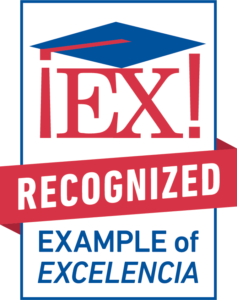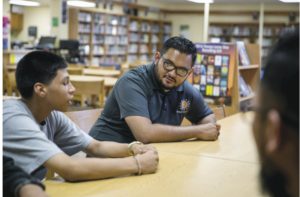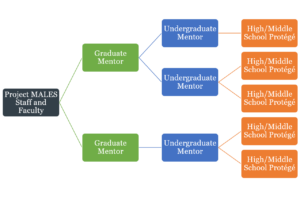Brotherhood | Leadership | College & Career Readiness | Health & Wellness | Identity

The Project MALES Student Mentoring Program is an award-winning research-based mentoring program for middle and high school young men in Austin, Texas. Originally piloted at William B. Travis Early College High School (ECHS) during the 2011-2012 academic year, our program has grown to serve five middle schools and five high schools in the Central Texas region through partnerships with local school districts. Currently, our mentoring sites include Austin ISD’s Gus Garcia Young Men’s Leadership Academy, Lively Middle School, Kealing Middle School, Webb Middle School, Lyndon B. Johnson ECHS, McCallum HS, Northeast ECHS, Travis ECHS and Del Valle ISD’s Dailey Middle School and Del Valle HS. Mentors, who are University of Texas at Austin undergraduate students, visit with local high school and middle school students every week to mentor and discuss various topics, ranging from college preparation to financial literacy to the skills needed to succeed in college and beyond.
Want to become a mentor? Want more information? Contact Clint LaFuente or Dr. Rodrigo Aguayo. You can also visit us on Facebook or follow us on Twitter.
Vision
Advancing educational outcomes for students at the local, state, and national level.
Mission
The Project MALES Student Mentoring Program collaborates with local schools and communities to implement and sustain effective mentoring services for students, focused on increasing post-secondary success.
The Model
 Since 2011, the Project MALES Student Mentoring Program has focused on relationship-building among undergraduate and graduate mentors and high school students in Central Texas school districts. This model is a research-informed initiative that highlights mentoring as a way to leverage social capital at various points in the educational pipeline to ultimately build a stronger college-going culture. The basic structure entails a “near-peer” philosophy, with UT college students mentoring middle and high school students to allow for long-term bonds to develop.
Since 2011, the Project MALES Student Mentoring Program has focused on relationship-building among undergraduate and graduate mentors and high school students in Central Texas school districts. This model is a research-informed initiative that highlights mentoring as a way to leverage social capital at various points in the educational pipeline to ultimately build a stronger college-going culture. The basic structure entails a “near-peer” philosophy, with UT college students mentoring middle and high school students to allow for long-term bonds to develop.
The mentoring model takes a dynamic and intergenerational approach to achieve increased personal and academic success and retention of students in both secondary and post-secondary educational settings. This model brings together three key groups: (I) professionals as role models, (II) current college students, and (III) students in local high and middle schools. In this model, professionals (e.g., graduate and higher education professionals) serve as mentors to students in college through academic experiences and preparation based on instruction and service-learning. In turn, these college students have the opportunity to engage in mentoring to local high school students.
This inter-generational model is structured around a variety of experiences that focus on experiential learning, research-based practices and pedagogy, leadership development, community engagement, and service. Mentors and mentees engage in the following formal activities:
- Weekly guided, purposeful peer-mentoring sessions across generational lines (professionals to college students, college students to high school students)
- Weekly meetings among college students (cohort-style experience) that will strengthen social bonds and cultivate a nurturing network between mentor participants
- Monthly Pláticas series that will feature prominent local speakers (e.g., professionals, role models) that will facilitate small group discussions among mentor participants
- Semester-long community outreach and/or service projects that will involve both mentors and mentees at both participating colleges and high schools
Critical Mentoring Curriculum

Brotherhood
We define brotherhood as a network and/or group bounded by shared values, principles, attitudes, and beliefs. These networks and/groups aim to challenge and empower their members in positive ways, and to hold each other accountable to these values and beliefs so they can collectively impact their local communities in positive and empowering ways.
Leadership
We define leadership in an individual and collective sense, as a person or groups who have the necessary qualities to be an example in multiple spaces: at home, in school, and in their communities. Leaders develop the ability to persevere and accept the support and input of others to work cohesively towards a common goal.
College & Career Readiness
We define college and career readiness as being academically and socially prepared to succeed in college and career. College and career readiness ensures that students have the tools, skills, and abilities to succeed and excel academically in school. Students should be able to translate these skills and abilities to succeed and excel in the workplace.
Health & Wellness
We define health and wellness as promoting healthy relationships amongst our students. Achieving health and wellness requires taking the initiative to improve our health holistically, and includes but it is not limited to students’ physical, mental, emotional, social, and spiritual health and well-being.
Identity
We define identity as the unique aspects that make individuals, in all their complexity, who they are rather than necessarily how they are defined by society and the media. We promote positive self-identity development by creating safe spaces for students to examine their own experiences and identities and to allow them to freely express it. Understanding identity development in its multiple expressions allows students to understand themselves, their experiences, and how they relate to other individuals and communities around them.




